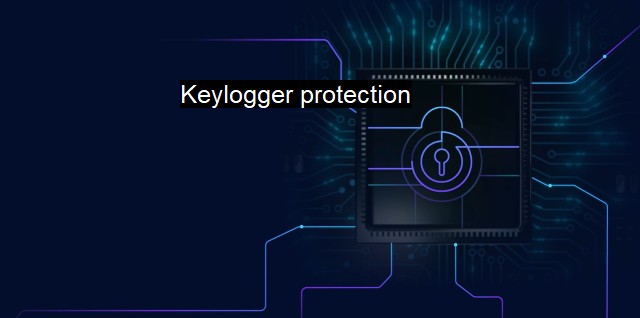What is Keylogger protection?
Ensuring Safe and Secure Computing: Understanding the Importance of Keylogger Protection in Today's Cyber Threat Landscape
Keylogger protection is one of the fundamental components of a comprehensive cybersecurity strategy, specifically built to counteract keyloggers, malicious software designed to record the keystrokes made on a computer.A keylogger is a dangerous type of tracking software that hackers use for of cyber espionage. Once installed, it can record every word, number, or symbol you type on your keyboard, capturing sensitive information such as usernames, passwords, credit card numbers, or personal information without your knowledge. The compromised data can then be used by the hackers in various fraudulent activities or even be sold on the black web.
When you understand the potential harm of keyloggers, you quickly acknowledge the importance of keylogger protection. This countermeasure is meant to effectively ensure your private data remains confidential, reducing data theft and helping protect the integrity of your digital life.
Modern antivirus programs provide robust keylogger protection, detecting and eliminating known keylogging software, and alerting users of suspicious activities that may be indicative of a keylogging attack. These programs depend on extensive and continuously updated databases that contain signatures and behavioral features linked to many keylogger types. When the antivirus program recognizes a match between these stored patterns and behavior present on your system, it flags it for malware, thereby stopping the silent capturing of your keystrokes.
A crucial characteristic of keylogger protection is its proactive search for prospective dangers. This level of security is achieved through heuristic analysis, an advanced cybersecurity method where machine learning techniques are used to predict and detect previously unidentified keyloggers based on their behavior. The technology analyzes the software attributes, identifying potential threats by looking for characteristic patterns associated with keyloggers.
To fully benefit from keylogger protection, you should complement antivirus software with secure practices. For instance, maintaining up-to-date software, avoiding downloading files or clicking on links from untrusted or unknown sources, and using strong, unique passwords are recommended practices.
Hardware keyloggers, which are physical devices plugged into the computer's keyboard port, pose a unique challenge to cybersecurity as most software-based protections fail in their presence. Here, best practices such as checking the physical computer after leaving it unattended in a public area or restricting unauthorized access to your system will be your best defenses.
Secure browsing practices also enhance keylogger protection. For instance, using unique passwords paired with two-factor authentication can add an additional layer of security. Using onscreen keyboards or voice-to-text tools can counter keystroke trackers as they bypass traditional typing.
Keylogger protection in cybersecurity revolves around the processes, tools, and strategies instituted to keep keyloggers at bay, safeguarding your private data against unauthorized spying. It's a proactive and defensive approach necessitating robust antivirus software and secure browsing practices. No matter how advanced we become digitally, hackers are also fine-tuning their methods of access. Protecting against them isn't merely trial-and-error; it's an ongoing cycle calling for vigilance, updates, and informed choices in surfing the internet sphere securely. Rest assured, a sturdy keylogger protection in place, supplementing overall cybersecurity, considerably minimizes the exposure to data theft and cybercrimes, thereby ensuring a safe cyber realm for users.

Keylogger protection FAQs
What is keylogger protection?
Keylogger protection is a cybersecurity measure that prevents malicious software from recording keystrokes made on a computer or mobile device. The aim is to prevent sensitive information such as login credentials, credit card details, and other personal data from being stolen by hackers.How does keylogger protection work?
Keylogger protection works by detecting and blocking the installation and operation of keylogging software on a device. This can be achieved through the use of antivirus software, firewalls, and other security tools that scan for and block malicious code. Some keylogger protection techniques also utilize encryption and secure browsing technology to prevent keystrokes from being intercepted.What are the benefits of keylogger protection?
The main benefit of keylogger protection is increased security and privacy. By preventing keylogging software from recording keystrokes, users can protect sensitive data and mitigate the risk of fraud or identity theft. Additionally, keylogger protection can help safeguard against more advanced cyber attacks such as phishing scams and malware infections.Do I need keylogger protection?
If you use your device to access sensitive information such as passwords, financial accounts, or personal data, then it is highly recommended that you use some form of keylogger protection. Keylogging is a common tactic used by hackers to steal sensitive information, so implementing protection can help mitigate this risk and keep your data safe.| | A | | | B | | | C | | | D | | | E | | | F | | | G | | | H | | | I | | | J | | | K | | | L | | | M | |
| | N | | | O | | | P | | | Q | | | R | | | S | | | T | | | U | | | V | | | W | | | X | | | Y | | | Z | |
| | 1 | | | 2 | | | 3 | | | 4 | | | 7 | | | 8 | | |||||||